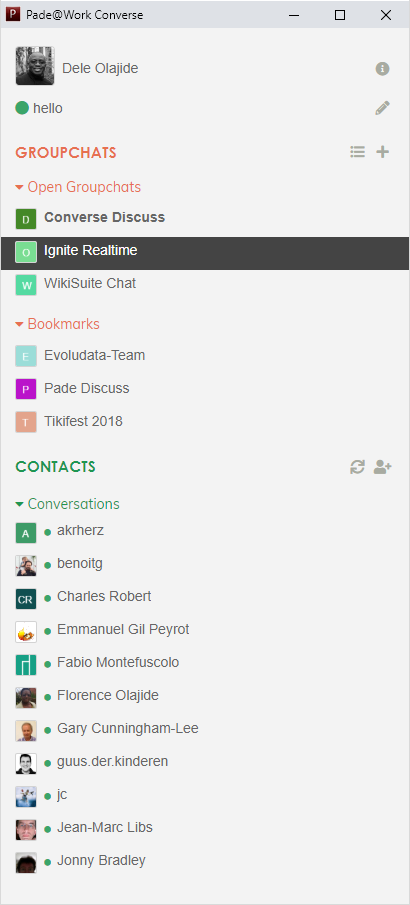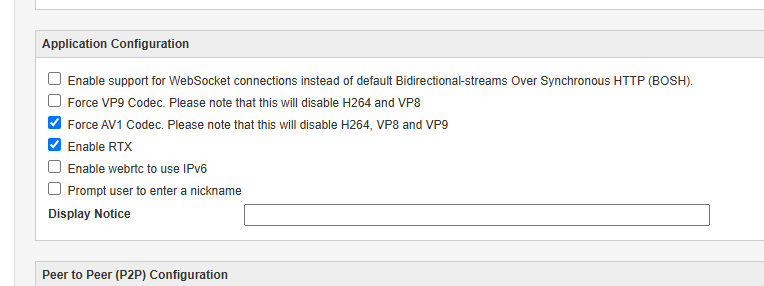Pàdé2.2.0
Pàdé is the Yoruba word for "Meet". It is a unified real-time collaboration client optimized for business and organizations implemented as a cross-platform browser extension.
- Converse.js for XMPP chat/groupchat with Openfire
- Jitsi Meet for SFU-based WebRTC audio/video conferencing, screen share and real-time application collaboration with Jitsi Video-bridge.
- CTXPhone for SIP based telephony and MCU audio/video conferencing with FreeSWITCH.

Empowering Digital Sovereignty with Openfire: A Secure and Customizable Communication Platform
4 days, 19 hours agoIn today’s interconnected world, digital sovereignty has become increasingly important for individuals and organizations seeking to maintain control over their data, infrastructure, and technologies. Openfire, an open-source, real-time collaboration (RTC) server that uses the XMPP (Extensible Messaging and Presence Protocol) protocol, offers a secure and customizable communication platform.
About Openfire
Openfire, produced by the IgniteRealtime community, is a mature, robust and scalable XMPP server that facilitates real-time communication and collaboration. It supports a wide range of features, including instant messaging, group chat, voice and video calls, and file sharing. Openfire’s open-source nature and extensive plugin architecture make it a versatile and customizable solution for organizations of all sizes. Openfire’s compatibility with various XMPP clients, including but not limited to IgniteRealtime’s own Pádè and Spark clients, further enhances its versatility and utility.
Data Privacy and Security
One of the key aspects of digital sovereignty is the ability to protect sensitive information and ensure data privacy. Openfire provides a secure communication platform that supports end-to-end encryption, secure authentication, and fine-grained access control. By hosting Openfire in-house or on a private cloud, organizations can maintain control over their communication data and reduce the risk of data breaches or unauthorized access. Additionally, Openfire’s open-source nature allows users to audit the code and verify the security of the platform, further enhancing trust and transparency.
Customization and Flexibility
Openfire offers a high degree of customization and flexibility, enabling organizations to tailor the platform to their specific needs and requirements. With a wide range of plugins and extensions, Openfire can be easily integrated with existing systems and workflows, allowing users to create a communication environment that aligns with their unique processes and preferences. This enables organizations to maintain control over their communication tools and adapt them to their evolving needs.
Compliance and Regulatory Control
Openfire’s customizable and secure nature makes it an ideal platform for organizations operating in regulated industries or jurisdictions with strict data protection laws. By hosting Openfire in-house or on a private cloud, organizations can ensure that their communication data remains within their control and complies with relevant regulations. Furthermore, Openfire’s extensive logging and monitoring capabilities enable users to demonstrate compliance and maintain a clear audit trail of their communication activities.
Interoperability with Other XMPP Solutions
Openfire’s interoperability with other XMPP-based platforms and clients is another significant advantage. By supporting the XMPP protocol, Openfire enables seamless communication and collaboration with users on other XMPP servers and clients, fostering a decentralized and open communication ecosystem. This interoperability allows organizations to maintain control over their communication infrastructure while still being able to connect and collaborate with external partners, customers, or stakeholders. Moreover, Openfire’s compatibility with other XMPP solutions reduces the risk of vendor lock-in and promotes a more open and competitive market for communication tools.
Conclusion
Openfire offers a powerful and secure communication platform that supports digital sovereignty by enabling organizations to maintain control over their data, infrastructure, and technologies. With its robust security features, customization capabilities, compliance-friendly nature, and interoperability with other XMPP solutions like Pádè and Spark, Openfire empowers users to create a communication environment that aligns with their unique needs and requirements. As digital sovereignty continues to gain importance in today’s interconnected world, Openfire provides a valuable solution for organizations seeking to enhance their autonomy, privacy, and security in digital interactions.
For other release announcements and news follow us on Mastodon or X
In January 2007, Ignite Realtime released the red5 plugin for Openfire which added the flash based open source Red5 media server as a plugin to Openfire (Wildfire). A year later, we added red5Phone, the first open source SIP based soft phone in a web browser.
Eighteen years later, WebRTC is now well established as the leading standard for audio and video conferencing and all that leading edge pioneer work here at Ignite evolved into Pàdé the web client, it’s supporting Openfire plugin and other plugins and clients supporting other audio and video use cases beyond meetings.
XMPP is now back in fashion and Openfire has always been a choice XMPP solution because it has the X factor. It is eXperienced, eXtensible, fleXible, eXperimental and eXciting and allowing use to easily integrate it with a wider diversity of signalling and media protocols and services.
However, the new attraction for XMPP is the push for open standards and messaging interoperability. Consequently, being able to also provide media (audio and video) interoperability in XMPP through Openfire will become one of the things we choose to focus on at Ignite going forward with audio and video communications. As previously hinted, we are moving forward with simplified, easy to maintain open standards that make media interoperability possible.
For now, that will be Online Meetings for audio and video conferencing services that have a web front end UI like Jitsi, Galene and BroadcastBox. For deeper integration into XMPP, that will be the Media Streams which is the XMPP wrapper to WHIP and WHEP.
In practice, it means development will stop on the Pade plugin for Openfire and all Jitsi based development and integration will only continue with Openfire Meetings plugin (ofmeet) which will become XEP 483 compliant. The Galene plugin for Openfire will also become XEP 483 compliant and both plugins can serve the new Online Meetings plugin for in ConverseJS web client.
The Openfire plugin called Ohun for audio conferencing is deprecated and a new plugin called OrinAyo which supports both music streaming and audio conferencing is in development and will become available very soon.
For other release announcements and news follow us on Mastodon or X
I get regular requests and issues have been raised about upgrading the Jitsi meet code in the Openfire Pade plugin to the latest versions. Unfortunately, this task is much more difficult than it sounds.
Jitsi Meet has evolved a lot since the early days of WebRTC. It has moved from being a Java platform agnostic, XMPP compatible self-hosting application into a Linux cloud hosted service.
The current code still depends on our Smack project for the XMPP client, but it uses Prosody as the XMPP server with quite a few extensions and modules coded in Lua which need to be ported to Java. Apart from not having time to work on it, I have also lost the motivation to step up to the challenge as I am more interested in using WHIP and WHEP with XMPP.
Nevertheless, an issue can round last week requesting for support of AV1 codec. This sparked enough motivation for me to spend my Easter holidays trying one more time to make the upgrade happen. The bad news is that I failed yet again, but the good news is that I was able to update the existing code to support AV1. Please note that codecs have pros and cons. VP9 is probably the best all rounder. H264 is best with devices that have hardware encoders and AV1 handles low bandwidth the best.
Openfire Pade plugin version 1.8.4 now supports the AV1 codec. You get the best results with P2P calls. As it is it more CPU intensive than VP9, you make get lower frame rates on low-spec servers. The latest Jitsi code has a lot more improvements and if you really need AV1 with many participants, seriously consider deploying the Jitsi Meet self-hosted instance in a container or VM.
As always, your instance of Openfire should automatically make available to update. Alternatively, you can download the new release of the plugin at the Openfire Pade plugin’s archive page.
For other release announcements and news follow us on Mastodon or X
Ignite Realtime community is happy to be able to announce the release of the Pàdé Openfire plugin version 1.8.3 . This version fixes the identified compatibility issues with Openfire 4.9.0
As always, your instance of Openfire should automatically make available to update in the next few hours. Alternatively, you can download the new release of the plugin at the Pade plugin’s archive page
For other release announcements and news follow us on Mastodon or X
